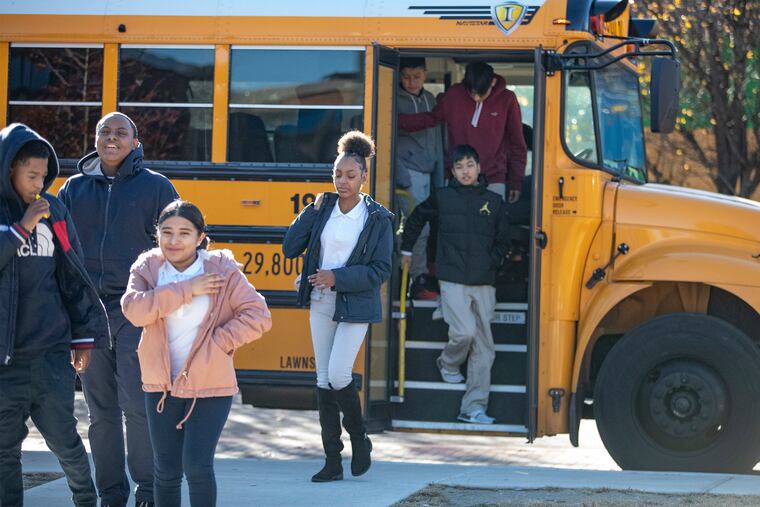Camden may have to close some schools, superintendent says
“We just can’t continue to do the same thing,” Camden Schools Chief Katrina McCombs on the need to close schools in the struggling district.

When the state took over the Camden school system in 2013 after years of poor student performance, the district enrolled more than 11,000 students in more than two dozen buildings.
Today, the district, once the largest in South Jersey, has lost about half of those students. The educational landscape has changed as thousands of students fled to other school options in the city.
In the latest proposed game-changer for Camden, state-appointed Superintendent Katrina McCombs wants to close several schools and reconfigure grades. Her plan would bring back middle schools — which were eliminated several years ago after performing poorly.
The changes would affect hundreds of students and teachers and change the academic structure by separating elementary and middle-school students. One proposal would leave North Camden without a traditional public school.
McCombs, the third chief to lead the struggling district since the takeover, says the moves would help close budget deficits that have ranged annually from $22 million to $44 million, and boost academics.
“We have to make some changes,” McCombs said. “We just can’t continue to do the same thing.”
The plan has drawn fierce opposition from some parents, community members, and union leaders, who have appealed to the state Department of Education to intervene. And it has stirred new questions about Camden’s status as a model for the changing landscape for urban public education.
The district turned five of its troubled schools over to Renaissance schools, which are publicly funded but privately operated.
Critics have charged that the district has focused too much on Renaissance and charter schools and not enough on how to transform the traditional public schools and boost enrollment.
“The consequences are catastrophic,” said Camden Education Association president Keith Benson. “The idea that the district has to close these schools is a lie.”
Currently, there are 19 district schools — more than the system needs or can afford for 6,347 students, McCombs said. Some are more than a century old and operating at 80% capacity, she said.
» READ MORE: Camden activists on a mission to Trenton to seek more funding for city’s schools
A planning committee that met for five months developed two school closure proposals that McCombs is weighing. She expects to announce a decision at a Jan. 26 school board advisory meeting.
The latest plan, released earlier this month, would close two schools, Sharp Elementary and Wiggins College Preparatory Lab School. Cooper’s Poynt Family School and Davis Elementary along with Creative Arts High School would be converted into middle schools.
An earlier proposal calls for closing Cooper’s Poynt and Sharp Schools. Creative Arts High, Davis Elementary, and Wiggins Elementary Schools would enroll middle-school students.
Parent Ronsha Dickerson, who served on the planning committee, said the district should not close schools during a pandemic.
“I stand against both plans,” said Dickerson, a mother of six.
Felix Moulier said his only child, a daughter, Zaina, 5, a kindergartner, loves attending Sharp School in the city’s Cramer Hill neighborhood. She would be sent to Veterans Memorial, about 1.4 miles away.
“It’s a major issue,” said Moulier, 35.
Another planning committee member, Sean Brown, said he supports closing schools because too many district schools need facility upgrades and have performed poorly academically. “We need a smaller district that provides a better education,” he said.
Both plans call for reconfiguring grade levels in schools from the current K-through-8 and 9-to-12 model to K through 5; 6 to 8; and 9 to 12. McCombs said the change would reduce teacher vacancies and help the district better compete.
The city’s eight charter schools enroll 4,188 students, while 12 Renaissance schools have 5,449 students.
Camden is the only district in the state that has all three types of public schools.
Benson believes the closings would move more students from traditional public schools. In some cases, students not eligible for courtesy busing would have to travel 1.8 miles each way to their new schools, he said.
“The likelihood is that they’re going to lose hundreds of students,” Benson said. “They’re not going to go through all of that.”
In 2019, Benson helped lead a charge that blocked McCombs from implementing parts of a sweeping plan to close two schools and consolidate another, and lay off employees. He says McCombs reneged on a deal to avoid school closures; she says there was no agreement.
On Friday, members of the Camden City Principals and Administrators Association are planning a sit-in to protest the proposed closings, said president Davida Coe-Brockington.
The state, under then-Gov. Chris Christie, took over the district in 2013 after years of poor test scores, a low graduation rate, and a high dropout rate. Christie tapped an outsider, Paymon Rouhanifard, to run the district.
» READ MORE: Katrina McCombs appointed new Camden schools chief amid fiscal troubles
McCombs said she understands that school closings generate high emotions, but contends she has little choice. The state has advised the district it would not receive additional funding and must tackle its deficits, she said.
“There are no perfect answers,” McCombs said. “This is not something I wished for in my wildest dreams.”